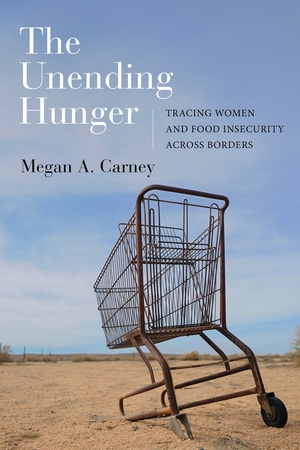
Rachael McCormick
University of South Florida
In The Unending Hunger: Tracing Women and Food Insecurity Across Borders, Megan Carney frames the city of Santa Barbara, California’s paradoxical problem as “hunger in the land of plenty.” Despite the region’s affluence and agricultural wealth, food insecurity occurs at a high rate. Carney attributes this problem to a neoliberal food regime which views food as a commodity – able to move across the southern border – while people lack both mobility and food. Rather than addressing the structural causes of food insecurity (evidenced by the high rates among women and people of color), food assistance typically consists of emergency relief and handouts.
Carney argues state approaches to food security, as to migration, are embedded in biopolitics. Food assistance agencies act as proxies of the state, bringing up questions of deservingness and surveillance. In the neoliberal context, the burden of procuring food falls on the individual. But not all individuals experience this burden equally: women, as the primary performers of caring labor, are tasked with feeding their families.
Carney, a critical medical anthropologist, is a faculty member at the University of Arizona with interests in migration, food systems and biopolitics (Carney, n.d.). The Unending Hunger is based on her dissertation at the University of California – Santa Barbara. Since then, her interest in migration has expanded into the Mediterranean region.
In The Unending Hunger, Carney characterizes her position as both insider (referring to her food-related activism during graduate school) and outsider (in relation to migrant women). Participants in her study were adult women who had migrated from Mexico or Central America and had experience with U.S. food assistance. Carney uses semi-structured and life history interviews, focus groups, dietary surveys and participant observation with both the population of interest as well as public health and nonprofit professionals. She draws heavily on feminist methodology, especially in her use of empowering methods like photo elicitation and focus groups. Based on these data, Carney found that concern for food is a central part of the migration experience for women. This was reflected in the terms alimentarse and comida saludable which women use when talking about the caring labor they perform. Carney also reports that subjectivities are altered through post-migration suffering and its embodied effects. Food insecurity in the migration context interacts with existing health vulnerabilities, increasing social suffering. However, rather than focusing on lack of food access, Carney calls attention to the ways she observed women strategically “making do,” cooperating, and resisting.
Carney’s book has a particularly strong gendered perspective which seeks to address a gap in the literature on migration: the experiences of women, as care workers, in addition to men as laborers. In some ways, The Unending Hunger can be thought of as a counterpart to Seth Holmes’ Fresh Fruit, Broken Bodies (2013). Holmes analyzes the health consequences of farm labor on migrant men engaged in food production, while Carney turns to women as consumers whose “caring labor” is not valued by a capitalist system.
Carney’s heavy-handed critique of the neoliberal food assistance paradigm seems unproductive at times. There is plenty of room for improvement in both the overall structure of food assistance as well as the individual sites where it is implemented. However, food assistance in its many forms (consider food banks, faith-based organizations and federal programs) is a vital support system for food-insecure populations. While Carney acknowledges the limits imposed upon these organizations by bureaucracy, donor funding, and policy, a more productive critique might include concrete ways for food assistance services to improve their interventions.
In The Unending Hunger, Carney provides a nuanced view of mobility – both of people and food – that brings in the under-analyzed gendered elements of migration and food procurement. The book will be of interest to medical anthropologists, food system planners and other professionals engaged in food security projects. It may not be received as warmly by the organizations Carney criticizes; these would benefit more from research that generated specific suggestions for mitigating food insecurity within the neoliberal context. Nevertheless, Carney’s book is a valuable addition to the literature on migration, gender and health.
Works Cited
Carney, M. (n.d.). About Megan Carney. Retrieved April 7, 2019, from https://anthropology.arizona.edu/user/megan-carney
Holmes, S. (2013). Fresh Fruit, Broken Bodies: Migrant Farmworkers in the United States. Berkeley: University of California Press.